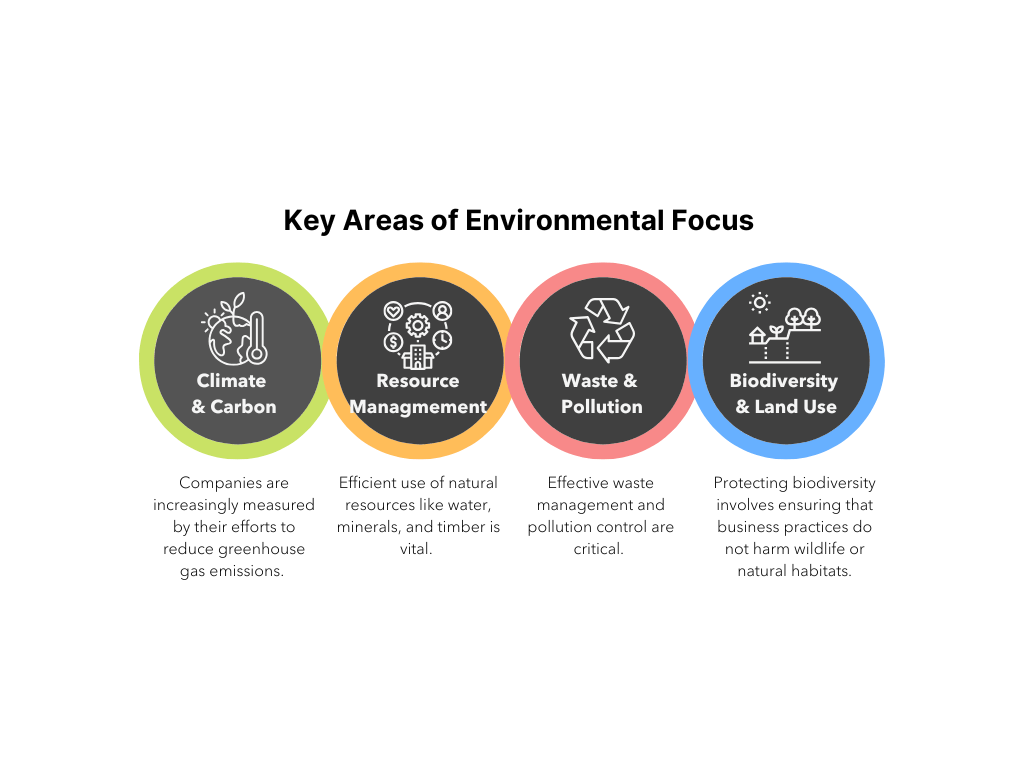The Critical Role of Environmental Considerations in ESG
Part 2 of a 4-Part Series
By Staci Hegarty, M.Ed.
The concept of Environmental, Social, and Governance (ESG) criteria has become a cornerstone in evaluating a company’s ethical impact and sustainability. While each component of ESG is essential, the environmental (E) aspect demands urgent attention in our current global context. Here’s why environmental considerations are paramount and how they shape the future of businesses and the planet.
What Does the ‘E’ in ESG Entail?
Environmental criteria involve assessing how a company’s operations impact the natural world. This includes a range of factors such as energy use, waste management, pollution, natural resource conservation, and the treatment of animals. It also covers the extent to which a company mitigates environmental risks and implements sustainable practices.
Key Areas of Environmental Focus
- Climate Change and Carbon Footprint: Companies are increasingly measured by their efforts to reduce greenhouse gas emissions. A smaller carbon footprint not only signifies environmental responsibility but also positions companies as leaders in the fight against climate change. This is crucial for long-term sustainability and aligning with global targets like the Paris Agreement.
- Resource Management: Efficient use of natural resources like water, minerals, and timber is vital. Companies need to adopt practices that minimize resource depletion and promote regeneration. Sustainable resource management reduces operational costs and ensures the longevity of essential resources.
- Waste and Pollution: Effective waste management and pollution control are critical. Companies must strive to minimize their waste output and manage it responsibly. This includes reducing plastic use, managing chemical waste, and ensuring safe disposal practices. Pollution control helps preserve ecosystems and protect public health.
- Biodiversity and Land Use: Protecting biodiversity involves ensuring that business practices do not harm wildlife or natural habitats. Sustainable land use practices prevent deforestation, soil degradation, and loss of biodiversity. Companies that prioritize biodiversity are seen as stewards of the environment.

Why the Environmental Component Matters
- Risk Mitigation: Ignoring environmental considerations can lead to significant risks, including regulatory fines, cleanup costs, and damage to a company’s reputation. Proactively addressing environmental risks can mitigate these potential issues. Risk mitigation may also have a role in determining future products. If a component of a product becomes scarce, it will be necessary to innovate solutions to revise or replace the need for that component.
- Investor Attraction: Investors are increasingly prioritizing sustainability. Companies with strong environmental practices attract more investment as they are perceived as lower risk and more future ready. Sustainable businesses are better positioned to adapt to changing regulations and market demands.
- Consumer Preference: Modern consumers are more environmentally conscious. They prefer to support companies that demonstrate a commitment to sustainability. This shift in consumer behavior drives companies to adopt greener practices to maintain and grow their market share.
- Long-term Sustainability: Environmental sustainability ensures that a company can continue its operations without depleting the resources it relies on. This long-term perspective is essential for a company’s survival and growth in an increasingly resource-constrained world.
- Regulatory Compliance: Governments and international bodies are imposing stricter environmental regulations. Companies that adhere to these regulations avoid legal penalties and enhance their credibility. Staying ahead of regulatory requirements ensures smooth operations and can provide a competitive edge.

Conclusion
Incorporating environmental criteria into business practices is not just an ethical imperative but also a strategic one. Companies that prioritize environmental sustainability position themselves as leaders in their industry, attract conscientious investors, and appeal to a growing base of eco-aware consumers.
The ‘E’ in ESG is critical for building a resilient, future-ready business that contributes positively to the planet. By integrating robust environmental practices, companies can drive sustainable growth and make a meaningful impact on global environmental challenges.
It’s time we give environmental sustainability the attention it deserves in our business strategies and operations. The future of our planet depends on it.
Visit our website at https://envisionrise.com.